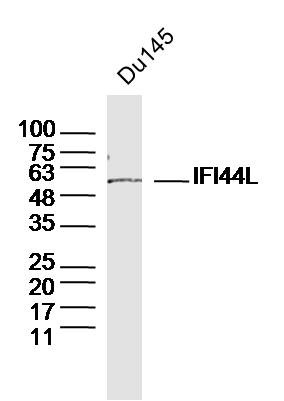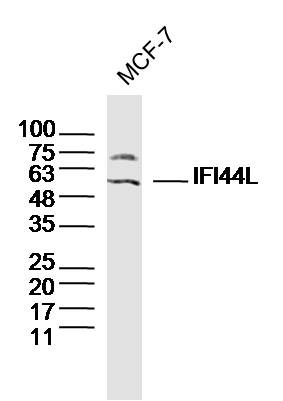Shopping Cart
Remove All Your shopping cart is currently empty
Your shopping cart is currently empty
Anti-IFI44L Polyclonal Antibody is a Rabbit antibody targeting IFI44L. Anti-IFI44L Polyclonal Antibody can be used in WB.
| Pack Size | Price | USA Warehouse | Global Warehouse | Quantity |
|---|---|---|---|---|
| 50 μL | $222 | 7-10 days | 7-10 days | |
| 100 μL | $374 | 7-10 days | 7-10 days | |
| 200 μL | $529 | 7-10 days | 7-10 days |
| Description | Anti-IFI44L Polyclonal Antibody is a Rabbit antibody targeting IFI44L. Anti-IFI44L Polyclonal Antibody can be used in WB. |
| Synonyms | Interferon-induced protein 44-like, IFI44L, IF44L, GS3686, C1orf29 |
| Ig Type | IgG |
| Reactivity | Human |
| Verified Activity | 1. Sample: Du145 Cell (Human) Lysate at 30 μg Primary: Anti-IFI44L (TMAB-00908) at 1/300 dilution Secondary: IRDye800CW Goat Anti-Rabbit IgG at 1/20000 dilution Predicted band size: 51 kDa Observed band size: 51 kDa 2. Sample: MCF-7 Cell (Human) Lysate at 30 μg Primary: Anti-IFI44L (TMAB-00908) at 1/300 dilution Secondary: IRDye800CW Goat Anti-Rabbit IgG at 1/20000 dilution Predicted band size: 51 kDa Observed band size: 51 kDa   |
| Application | |
| Recommended Dose | WB: 1:500-2000 |
| Antibody Type | Polyclonal |
| Host Species | Rabbit |
| Subcellular Localization | Cytoplasm (Potential). |
| Construction | Polyclonal Antibody |
| Purification | Protein A purified |
| Appearance | Liquid |
| Formulation | 0.01M TBS (pH7.4) with 1% BSA, 0.02% Proclin300 and 50% Glycerol. |
| Concentration | 1 mg/mL |
| Research Background | IFI-44L is a 452 amino acid cytoplasmic protein that shares some sequence similarities with IFI-44. IFI-44 is a cytoplasmic protein that aggregates to form microtubule structures. The genes that encode IFI-44L and IFI-44 are located on chromosome 1, which is the largest human chromosome spanning about 260 million base pairs and making up 8% of the human genome. There are about 3,000 genes on chromosome 1, and considering the great number of genes there are also a large number of diseases associated with chromosome 1. Notably, the rare aging disease Hutchinson-Gilford progeria is associated with the LMNA gene which encodes lamin A. When defective, the LMNA gene product can build up in the nucleus and cause characteristic nuclear blebs. The mechanism of rapidly enhanced aging is unclear and is a topic of continuing exploration. Stickler syndrome, Parkinsons, Gaucher disease and Usher syndrome are also associated with chromosome 1. Aberrations in chromosome 1 are found in a variety of cancers including head and neck cancer, malignant melanoma and multiple myeloma. |
| Immunogen | KLH conjugated synthetic peptide: human IFI44L |
| Antigen Species | Human |
| Gene Name | IFI44L |
| Gene ID | |
| Protein Name | Interferon-induced protein 44-like |
| Uniprot ID | |
| Function | Exhibits a low antiviral activity against hepatitis C virus. |
| Molecular Weight | Theoretical: 51 kDa. |
| Stability & Storage | Store at -20°C or -80°C for 12 months. Avoid repeated freeze-thaw cycles. |
| Transport | Shipping with blue ice. |
| Size | Quantity | Unit Price | Amount | Operation |
|---|

Copyright © 2015-2026 TargetMol Chemicals Inc. All Rights Reserved.